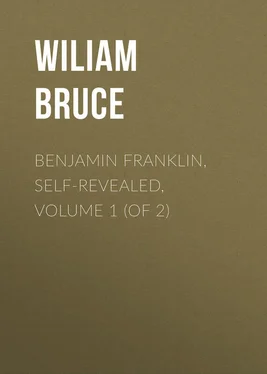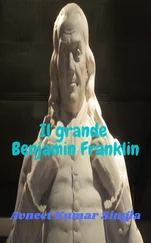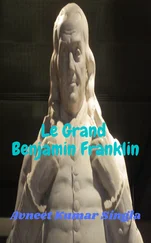Wiliam Bruce - Benjamin Franklin, Self-Revealed, Volume 1 (of 2)
Здесь есть возможность читать онлайн «Wiliam Bruce - Benjamin Franklin, Self-Revealed, Volume 1 (of 2)» — ознакомительный отрывок электронной книги совершенно бесплатно, а после прочтения отрывка купить полную версию. В некоторых случаях можно слушать аудио, скачать через торрент в формате fb2 и присутствует краткое содержание. Жанр: foreign_antique, foreign_prose, на английском языке. Описание произведения, (предисловие) а так же отзывы посетителей доступны на портале библиотеки ЛибКат.
- Название:Benjamin Franklin, Self-Revealed, Volume 1 (of 2)
- Автор:
- Жанр:
- Год:неизвестен
- ISBN:нет данных
- Рейтинг книги:5 / 5. Голосов: 1
-
Избранное:Добавить в избранное
- Отзывы:
-
Ваша оценка:
- 100
- 1
- 2
- 3
- 4
- 5
Benjamin Franklin, Self-Revealed, Volume 1 (of 2): краткое содержание, описание и аннотация
Предлагаем к чтению аннотацию, описание, краткое содержание или предисловие (зависит от того, что написал сам автор книги «Benjamin Franklin, Self-Revealed, Volume 1 (of 2)»). Если вы не нашли необходимую информацию о книге — напишите в комментариях, мы постараемся отыскать её.
Benjamin Franklin, Self-Revealed, Volume 1 (of 2) — читать онлайн ознакомительный отрывок
Ниже представлен текст книги, разбитый по страницам. Система сохранения места последней прочитанной страницы, позволяет с удобством читать онлайн бесплатно книгу «Benjamin Franklin, Self-Revealed, Volume 1 (of 2)», без необходимости каждый раз заново искать на чём Вы остановились. Поставьте закладку, и сможете в любой момент перейти на страницу, на которой закончили чтение.
Интервал:
Закладка:
God is very good to us both in many Respects [he wrote]. Let us enjoy his Favours with a thankful & chearful Heart; and, as we can make no direct Return to him, show our Sense of his Goodness to us, by continuing to do Good to our Fellow Creatures, without Regarding the Returns they make us, whether Good or Bad. For they are all his Children, tho' they may sometimes be our Enemies. The Friendships of this World are changeable, uncertain, transitory Things; but his Favour, if we can secure it, is an Inheritance forever.
With respect to the successful issue, to which a manifest Providence had, after so many vicissitudes and perils, conducted the American Revolution, he wrote to Josiah Quincy in words as solemn as a Te Deum :
Considering all our Mistakes and Mismanagements, it is wonderful we have finished our Affair so well, and so soon. Indeed, I am wrong in using that Expression, " We have finished our Affair so well ". Our Blunders have been many, and they serve to manifest the Hand of Providence more clearly in our Favour; so that we may much more properly say, These are Thy Doings, O Lord, and they are marvellous in our Eyes .
Franklin might well have seen the hand of Providence in the momentous result for which he had dared so much and labored so long, and which meant so much to human history, but its shaping power over the destiny of even such a Murad the Unlucky as his hapless nephew, Benny Mecom, is recognized by him in a letter to his beloved sister, Jane Mecom, and her husband when Benny had gone off to seek his fortune as a printer in Antigua. "After all," he concludes, "having taken care to do what appears to be for the best , we must submit to God's providence, which orders all things really for the best." On another occasion, in an ingenious paper on Water Spouts, the sage philosopher, seeing in the benign manner in which the waters of the ocean rid themselves of salt, in the process of evaporation, the same God that the poor Indian sees in the clouds or hears in the wind, impressively exclaims: "He who hath proportioned and given proper Qualities to all Things, was not unmindful of this. Let us adore Him with Praise and Thanksgiving." There are certain human feelings which rise in moments of uncommon stress or fervor from the profoundest depths of our being to our lips and take on the form and rhythm of sonorous religious utterance, if for no better reason, because no other language is lofty or musical enough to serve aptly the purposes of such supreme occasions; and this is true even of an individuality so meagrely spiritual as that of Franklin.
Other expressions of the same character furnish a religious or quasi-religious setting to Franklin's thoughts upon his own dissolution. To his brave and cheerful spirit, which experienced so little difficulty in accommodating its normal philosophy to all the fixed facts and laws of existence, death was as natural as life – a thing not to be invited before its time but to be accepted with unmurmuring serenity when it came. The only certain things in this world, he said in his home-spun way, are death and taxes.
It is the will of God and nature [he wrote in his fifty-first year to Elizabeth Hubbard, after the death of his brother John] that these mortal bodies be laid aside, when the soul is to enter into real life. This is rather an embryo state, a preparation for living. A man is not completely born until he be dead. Why then should we grieve, that a new child is born among the immortals, a new member added to their happy society?
We are spirits. That bodies should be lent us, while they can afford us pleasure, assist us in acquiring knowledge, or in doing good to our fellow creatures, is a kind and benevolent act of God. When they become unfit for these purposes, and afford us pain instead of pleasure, instead of an aid become an incumbrance, and answer none of the intentions for which they were given, it is equally kind and benevolent, that a way is provided by which we may get rid of them. Death is that way. We ourselves, in some cases, prudently choose a partial death. A mangled painful limb, which cannot be restored, we willingly cut off. He who plucks out a tooth, parts with it freely, since the pain goes with it; and he, who quits the whole body, parts at once with all pains and possibilities of pains and diseases which it was liable to, or capable of making him suffer.
Our friend and we were invited abroad on a party of pleasure, which is to last forever. His chair was ready first, and he is gone before us. We could not all conveniently start together; and why should you and I be grieved at this, since we are soon to follow, and know where to find him? Adieu.
It was a sane, bright conception of human destiny indeed which could convert the grim ferryman of the Styx into little more than an obsequious chairman, waiting at the portals of life until it suited the convenience of his fare to issue from them.
That Being [he wrote to George Whitefield] who gave me Existence, and thro' almost three-score Years has been continually showering his Favours upon me, whose very Chastisements have been Blessings to me; can I doubt that he loves me? And, if he loves me, can I doubt that he will go on to take care of me, not only here but hereafter? This to some may seem Presumption; to me it appears the best grounded Hope; Hope of the Future, built on Experience of the Past.
The same thought is repeated in a letter to William Strahan, followed, however, by the dig which he rarely failed to give to his Tory friend, "Straney," when he had the chance:
God has been very good to you, from whence I think you may be assured that he loves you, and that he will take at least as good care of your future Happiness as he has done of your present. What Assurance of the Future can be better founded than that which is built on Experience of the Past ? Thank me for giving you this Hint, by the Help of which you may die as chearfully as you live. If you had Christian Faith, quantum suff. , this might not be necessary; but as matters are it may be of Use.
This hopeful outlook continued until the end. In a letter to his "dear old friend," George Whatley, which was written about five years before the writer's death, he adds a resource borrowed from his scientific knowledge to the other resources of his tranquil optimism.
You see [he said] I have some reason to wish, that, in a future State, I may not only be as well as I was , but a little better. And I hope it; for I, too, with your Poet, trust in God . And when I observe, that there is great Frugality, as well as Wisdom, in his Works, since he has been evidently sparing both of Labour and Materials; for by the various wonderful Inventions of Propagation, he has provided for the continual peopling his World with Plants and Animals, without being at the Trouble of repeated new Creations; and by the natural Reduction of compound Substances to their original Elements, capable of being employ'd in new Compositions, he has prevented the Necessity of creating new Matter; so that the Earth, Water, Air, and perhaps Fire, which being compounded form Wood, do, when the Wood is dissolved, return, and again become Air, Earth, Fire, and Water; I say that, when I see nothing annihilated, and not even a Drop of Water wasted, I cannot suspect the Annihilation of Souls, or believe, that he will suffer the daily Waste of Millions of Minds ready made that now exist, and put himself to the continual Trouble of making new ones. Thus finding myself to exist in the World, I believe I shall, in some Shape or other, always exist.
In a letter to M. Montaudouin in 1779, in reply to one from that friend applying to him the prayer of Horace for Augustus, he remarked: "Tho' the Form is heathen, there is good Christian Spirit in it, and I feel myself very well disposed to be content with this World, which I have found hitherto a tolerable good one, & to wait for Heaven (which will not be the worse for keeping) as long as God pleases." But later on, when seven more years of waning strength had passed, he wrote to his friend Jonathan Shipley, the Bishop of St. Asaph's:
Читать дальшеИнтервал:
Закладка:
Похожие книги на «Benjamin Franklin, Self-Revealed, Volume 1 (of 2)»
Представляем Вашему вниманию похожие книги на «Benjamin Franklin, Self-Revealed, Volume 1 (of 2)» списком для выбора. Мы отобрали схожую по названию и смыслу литературу в надежде предоставить читателям больше вариантов отыскать новые, интересные, ещё непрочитанные произведения.
Обсуждение, отзывы о книге «Benjamin Franklin, Self-Revealed, Volume 1 (of 2)» и просто собственные мнения читателей. Оставьте ваши комментарии, напишите, что Вы думаете о произведении, его смысле или главных героях. Укажите что конкретно понравилось, а что нет, и почему Вы так считаете.










![Benjamin Franklin - Memoirs of Benjamin Franklin; Written by Himself. [Vol. 2 of 2]](/books/747975/benjamin-franklin-memoirs-of-benjamin-franklin-wr-thumb.webp)
![Benjamin Franklin - Memoirs of Benjamin Franklin; Written by Himself. [Vol. 1 of 2]](/books/748053/benjamin-franklin-memoirs-of-benjamin-franklin-wr-thumb.webp)
